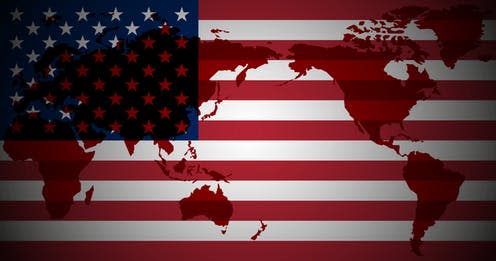US public is far less isolationist than experts, especially the media, think

What a difference a few months can make. In December 2018, US president Donald Trump shocked and angered his own foreign policy establishment – and many ordinary Americans – by ordering the total withdrawal of US troops from Syria. The move was widely seen as evidence of a more isolationist, “America First” United States.
Now, according to reports (some of which are conflicting), Trump intends to leave somewhere between 400 and almost 1,000 troops in the country. “I agree 100%. ALL is being done,” Trump remarked in response to a recent call by several senators to maintain American forces in Syria.
The choice to keep a US military presence in Syria surely reassures experts who worried that exiting the war-torn nation completely would create a dangerous power vacuum for Iran to exploit. But what actually explains Trump’s change of heart?
The move could be just another instance of the commander-in-chief making a high-stakes national security decision on a whim, without premeditation or predictability. More likely, however, is that the backtrack is political – designed to win votes among ordinary Americans – especially as the president looks forward to the 2020 election.
What the US wants
Following Trump’s declaration to remove US troops from Syria, several observers (including ourselves) noted that the decision was a clear (and rare) break from what the American public, especially conservatives, wanted. In fact, according to 2018 data from the Chicago Council on Global Affairs think tank, 70% of Trump-backing Republicans thought that America should actively fight extremists in places like Syria.
Nevertheless, one assumes that Trump didn’t expect such a poor reception to bringing the troops home – maybe among hawks in the Pentagon, but certainly not among his dyed-in-the-wool base. If Americans really are as isolationist as many assume, surely they’d be delighted by his winding down of US overseas commitments.
But experts, especially in the media, often portray the American public as more isolationist than it is. Prior to the backlash over Syria, it wasn’t uncommon to read about fatigue among the American public over US commitments around the world. Yet such pictures of a “war-weary” nation belie how Americans really feel about exercising US power abroad.

Put simply, many experts seem to underestimate how active the American public wants the US to be in the world. And the evidence isn’t just anecdotal; the numbers back it up.
We analysed unique paired surveys from the Chicago Council on Global Affairs that asked a nationally-representative sample of Americans how active a role the US should take abroad, and also asked experts (comprised of the media, academics, think tank scholars, interest group members, Congressional staff, and staff working in executive branch agencies) to guess how the public replied.
A full 70% of the American public agreed that the US should maintain an active footprint across the globe. Experts, however, woefully missed the mark in their estimations. On average, they thought the answer was only 50%.
Experts also varied widely in how inaccurately they gauged public attitudes. The media, who guessed the answer was just 45%, wrongly estimated public beliefs more than any other expert group.
Trump rethinks his strategy
These results matter not just for the case of Syria, but more broadly when it comes to America’s use of power in the world. After the backlash during the George W. Bush administration over “nation-building” in Iraq and Afghanistan, experts in Washington and elsewhere underwent considerable soul-searching about the appropriate use of US force globally.
For his part, Trump’s “America First” approach to foreign policy has been largely isolationist on issues such as trade, nuclear anti-proliferation, and the environment. Yet as the White House’s backpedalling on Syria shows, the president may be rethinking this inward-looking strategy.
Ultimately, Trump seems to have learned the hard way what happens when politicians act on what they think the American public desires, without also checking the raw data. Based more on hunches and perceptions than evidence, that kind of logic can land politicians in trouble, especially those, like Trump, who like to follow the political winds.
By maintaining a US troop presence in Syria, Trump appears to be atoning for his political sins as he strives to appease his base going into 2020. When it comes to the larger issue of promoting the active US foreign policy that his voters support, however, will it be too little, too late?
This article is republished from The Conversation under a Creative Commons license. Read the original article.

Jonathan Monten collaborates with the Chicago Council on Global Affairs on a biannual survey of foreign policy experts.
Thomas Gift does not work for, consult, own shares in or receive funding from any company or organisation that would benefit from this article, and has disclosed no relevant affiliations beyond their academic appointment.

 Yahoo News
Yahoo News 